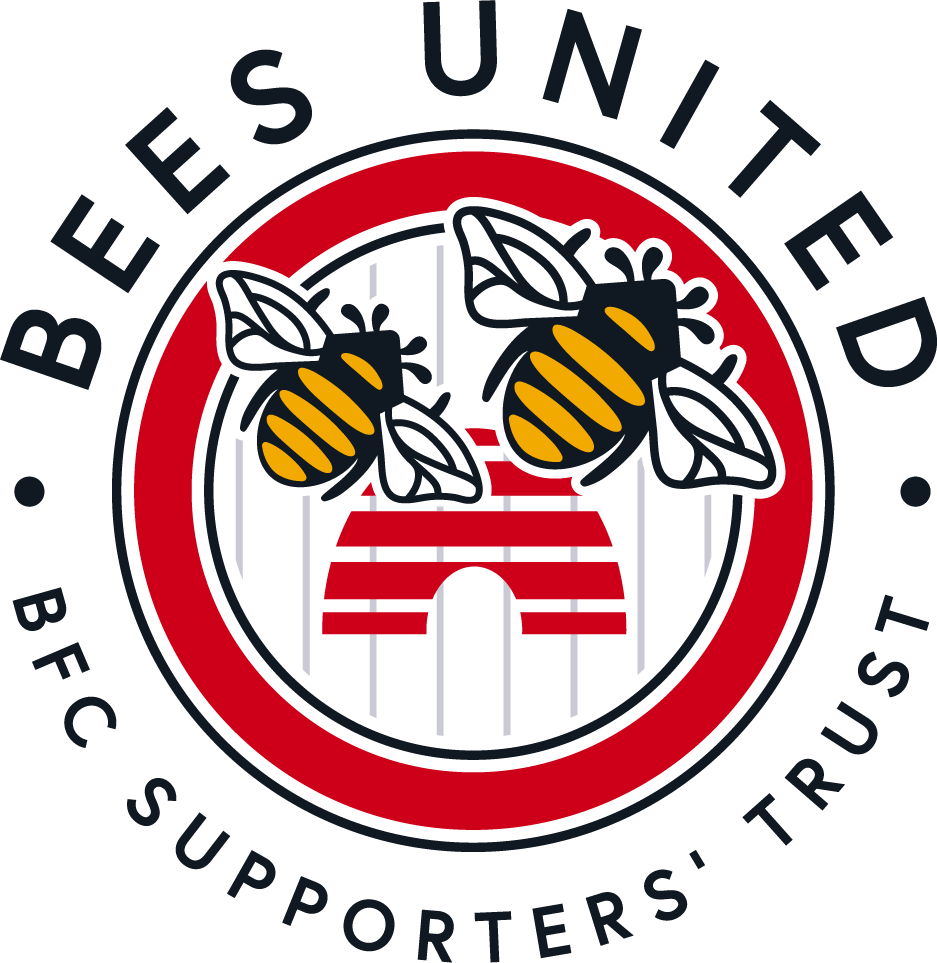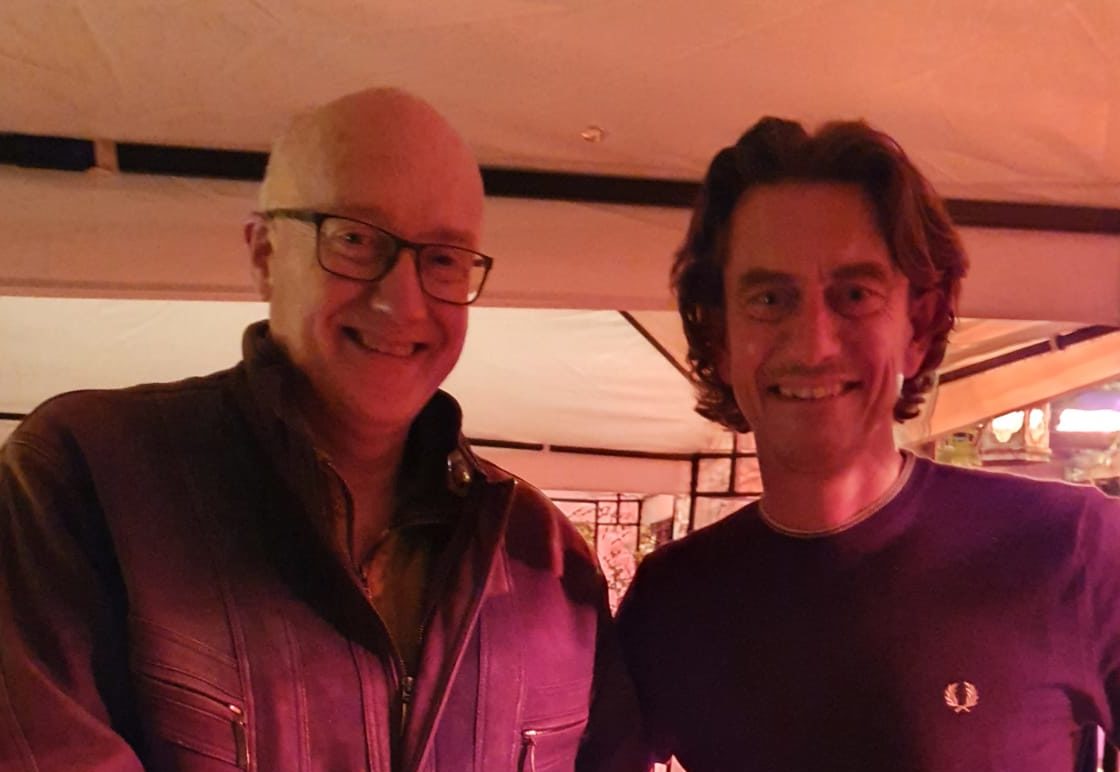On May 10th, his 60th birthday, Bees fan Nigel Miller got a Brentford cake baked by his daughter Katie and his wife Jessica asked the club to organise a recorded message from Peter Gilham. Nigel also received a birthday phone call from club director and Bees United Chairman Stewart Purvis.
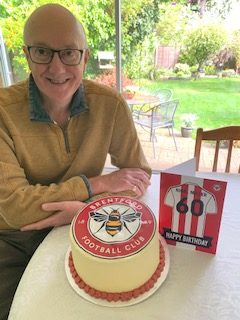
Nigel Miller with a cake baked by his daughter Katie.
But the undoubted highlight came when he and his wife went to dinner at an Italian restaurant in Chiswick and found Thomas Frank eating there too.’ I went up and said ‘‘Thomas I am really sorry to bother you, my wife tries to make birthdays special.” Thomas replied “Nigel what you don’t know is that your wife arranged for me to be here today to have your photo taken with me. So let’s do it straightaway” I didn’t even have to ask. I thought that was absolutely lovely.”
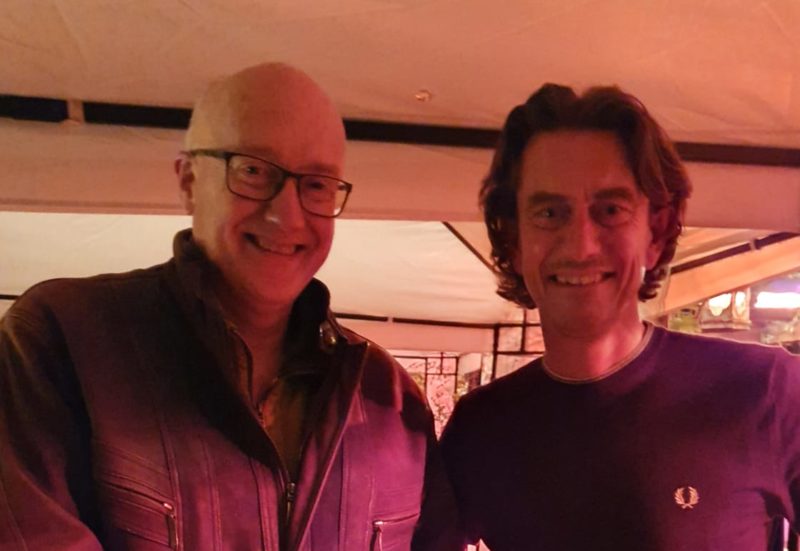
What Nigel would never have guessed was that a few weeks later Thomas Frank would single out their meeting, without naming Nigel, in a special video message to fans from Wembley.
https://twitter.com/SkyBet/status/1398698121899778048
Nigel replied on twitter.
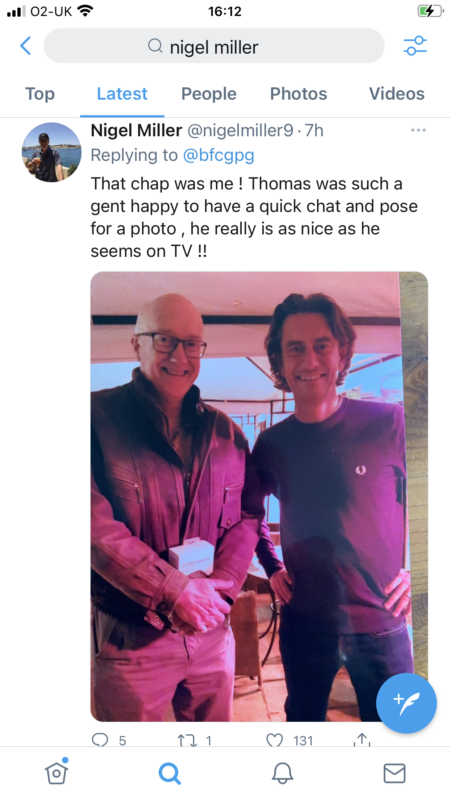
Nigel told Bees United; ‘”Amazing really that Thomas remembered, I’m sure he’s been fairly busy lately. Saturday was an amazing unforgettable day that just got better and better as it went on’.
BU’s own conversations with Nigel started three weeks ago about a cutting from the Richmond and Twickenham Times in 1916. It had been brought back by a relative of Nigel who was a survivor of the Battle of the Somme and a keen Brentford fan. The article records the death in action in August 1916 of a former Brentford player, Private Henry or Harry Purver.
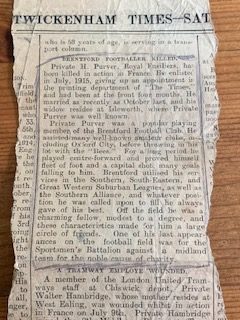
Thanks to research by club historians Rob Jex and Paul Briers we know Purver made his debut in the first team in a Southern league match at Coventry in December 1911. Brentford were playing their fourth game in 5 days and were missing seven first team starters who were injured. Unsurprisingly Brentford lost 0-9, it is still the record defeat in 132 years of Brentford football. He only played a handful more first team games but was on the club books, mostly as a regular goalscorer in the reserves, until 1914.
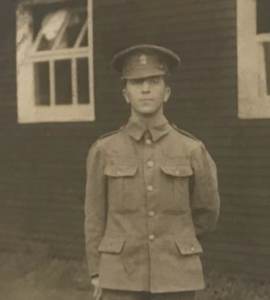
Private Henry Purver
A local from Isleworth he gave up his job in the printing department of The Times to join the Royal Fusiliers in 1915. He suffered from a gas attack shortly after enlisting but returned to the front until he was killed on 31st July 2016 while serving with what was called a ‘Sportsman’s Battalion’. He was commemorated on the Thiepval memorial to those killed in France with no known grave, the Isleworth War Memorial and a WW1 Memorial at Griffin Park.
The cutting reporting his death came back at the end of the war in the wallet of Bees supporter Albert Fredericks.He was also from Isleworth, had been in the same regiment as Purver and was wounded in the same battle, at a place called Delville Wood, so it is possible they knew each other. Albert’s grandson Nigel Miller has retraced his steps in battlefield tours and tells the story of his grandfather and Albert’s brother Reg: “Albert and Reg were both Brentford supporters when the Bees were still in the Southern League and played at a cricket ground in Boston Manor.
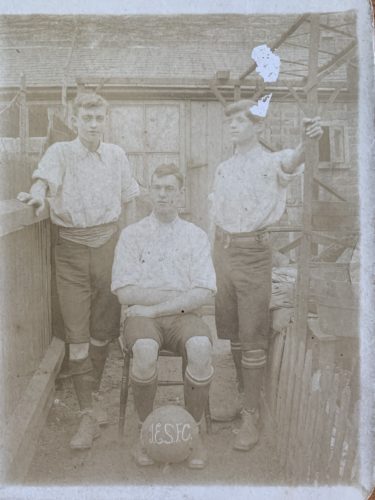
Albert Fredericks (centre) before he joined the ‘Sportsman’s Battalion’. If you know what IEFSC stands for please let us know.
The brothers enlisted into the army as volunteers at Hounslow Barracks, Albert into the Royal Fusiliers, Reg into the Middlesex Regiment despite the fact that at 16 he was under age. Reg was only 18 when he was killed in the Battle of the Somme. He too had no known grave and is remembered at Thiepval and Isleworth Memorials. His mother never believed he was dead for the rest of her life and left the back door open in case he came home.
“My grandfather Albert Fredericks nearly lost a leg in the war but came home in 1919. In his wallet was the cutting about the death of Purver and loads of photos.The wallet has a hole, apparently not big enough to be a bullet hole but it could be caused by a piece of shrapnel. Lots of the photos have got a little hole in them, potentially the wallet could have been in his breast pocket and perhaps saved him from an even worse wound.
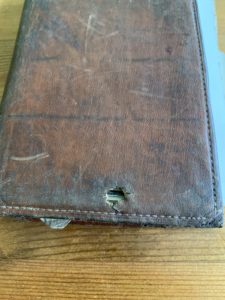
“The family story is that he got back on a Saturday with a big army sack on his shoulder, and immediately declared that he was going to Brentford that afternoon. He was a massive fan and went to all the great games as the Bees rose up the leagues, eventually to Division One where in the 1937-8 season they were on track for the League and Cup double for a time, before finishing sixth and reaching the sixth round of the Cup.”
Alberts’s daughter Hilda – Nigel’s Mum- carried on the family tradition of supporting the Bees and built up a collection of hundreds of programmes in the loft. She took Nigel to a game in the 1971-2 season and he was hooked too, only missing about a dozen home games since then. “Its a lifetime of supporting the Bees, goodness knows how many holidays have been rearranged, weddings missed, just to go to Brentford. Football means different things at different stages of your life, whatever is going on in our lives, however good or bad, when you are at a game you just forget it all don’t you.”
